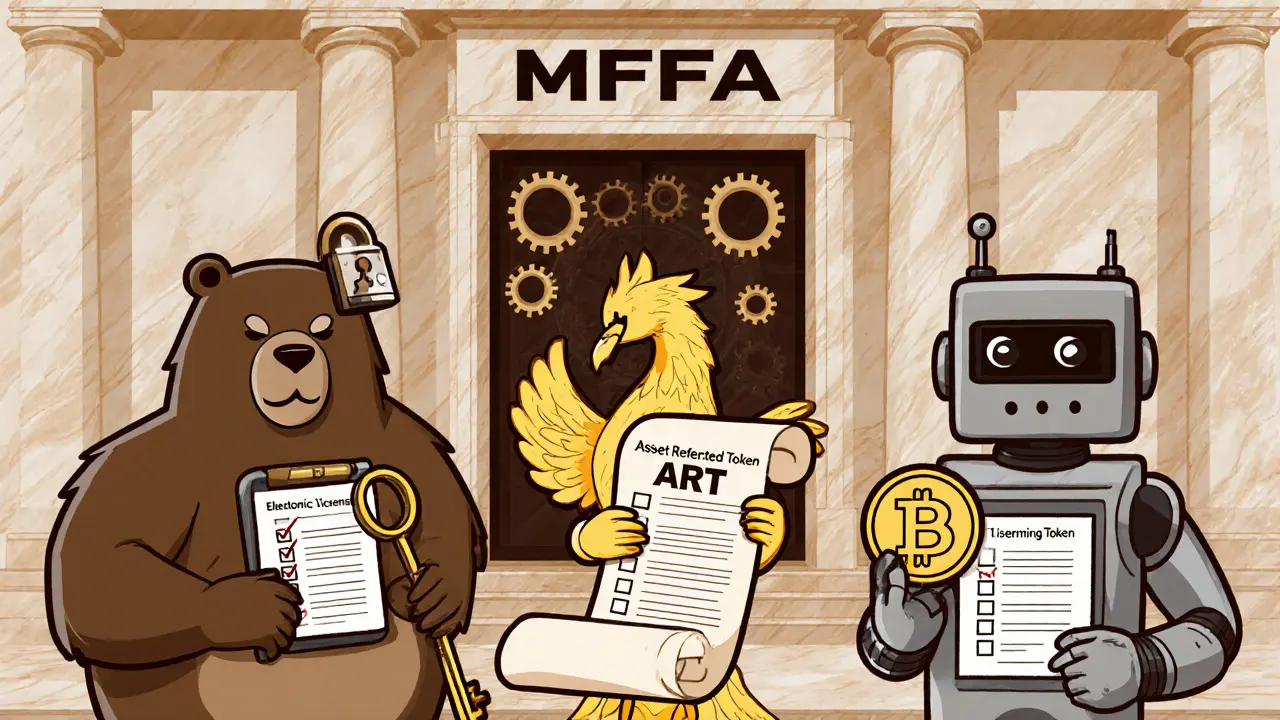Malta Crypto Licence Fee Calculator
Key Cost Drivers
- For CASPs: Transaction volume, staff headcount
- For ARTs: Asset backing value, token supply
- For EMTs: Payment-service volume, reserve requirements
Estimated Total Costs
Breakdown
- Initial fee: €0.00
- Annual fee: €0.00
- Total for 1 year(s): €0.00
If you’re looking for Malta crypto regulation insights, you’re in the right place. The Malta Financial Services Authority (MFSA) has built a detailed framework that blends EU‑wide rules with local experience, and today we’ll break down exactly what that means for anyone wanting to launch or run a crypto‑related business on the island.
Key Takeaways
- The MFSA is the competent authority for crypto under the Markets in Crypto‑Assets Act (MICA Act), which implements the EU Markets in Crypto‑Assets Regulation (MiCA).
- Three main licensing tracks exist: Crypto‑Asset Service Providers (CASPs), Asset‑Referenced Token (ART) issuers, and Electronic Money Token (EMT) issuers.
- Authorization starts with a white‑paper notification (for ARTs and certain token offerings) and a detailed compliance dossier.
- Ongoing duties cover conflict‑of‑interest management, consumer protection, AML checks via the Financial Intelligence Analysis Unit (FIAU), and regular reporting.
- Fees are proportional, based on activity size, and the MFSA publishes a clear schedule in the 2024 Fees Regulations.
1. The MFSA and Its Legal Backbone
When you hear "MFSA" you’re hearing about the Malta Financial Services Authority, the island’s regulator for banking, insurance, and now crypto. Its crypto mandate stems from the Markets in Crypto‑Assets Act, enacted in November2024 (Act No.XXXVI of2024). This Act mirrors the EU’s MiCA Regulation but adds Maltese‑specific details and a fee framework.
The MFSA’s supervisory approach is hands‑on. Since the first MiCA licences were handed out in early 2025, the authority has run workshops (e.g., "Building a Compliant Crypto Future" in June2025) to walk operators through conflict‑of‑interest rules, AML obligations, and reporting routines.
2. Who Needs a Licence?
The law splits crypto entities into four recognised categories, but most businesses fall into three core tracks:
- Crypto‑Asset Service Providers (CASPs): firms that offer custody, exchange, or advisory services.
- Asset‑Referenced Token (ART) issuers: tokens pegged to assets like gold, real‑estate, or commodities.
- Electronic Money Token (EMT) issuers: stablecoins used for payments, subject also to the Financial Institutions Act.
Each track has its own licensing checklist, but they all share a common baseline: a formal application to the MFSA, a vetted white‑paper (where required), and proof of robust AML/KYC controls.

3. Step‑by‑Step: Getting Authorised
- Pre‑application research: Review the MiCA Rulebook (published March2025) to understand technical requirements for your token type.
- Prepare your white‑paper: For ARTs and EMTs, the document must detail token economics, asset backing, governance, and risk disclosures. The MFSA checks for clarity and consumer‑fairness.
- Submit the notification: Upload the white‑paper and a compliance dossier via the MFSA’s e‑portal. Expect a 30‑day review for CASPs and a 45‑day review for token issuers.
- Fit‑and‑proper assessment: Key personnel must pass background checks, demonstrate relevant experience, and declare any conflicts of interest.
- Pay the licence fee: Fees range from €2,000 for a small‑scale CASP to €15,000 for a high‑volume EMT issuer, as set out in the 2024 Fees Regulations (L.N.295 of2024).
- Receive the licence: Once granted, you’ll get a licence certificate and a unique MFSA licence number. Publication in the official Gazette follows.
After the licence is issued, the real work begins-ongoing supervision.
4. Ongoing Compliance Obligations
MFSA’s supervisory focus is on market conduct and consumer protection. Here’s what you’ll need to keep on your radar:
- Conflict‑of‑interest management: Document any relationships that could bias advice or trading. The MFSA expects a written policy and quarterly disclosures.
- Reporting: Submit a quarterly activity report (transaction volumes, AML alerts) and an annual audited financial statement.
- AML/KYC: The Financial Intelligence Analysis Unit (FIAU) enforces AML checks. You must retain customer data for at least five years and report suspicious activity within 24hours.
- Consumer protection: Clear terms of service, transparent fee structures, and an easy‑to‑use complaint mechanism are mandatory.
- Technical standards: Follow the MiCA Rulebook’s IT security guidelines - multi‑factor authentication, encryption at rest, and regular penetration testing.
Non‑compliance can trigger fines up to 5% of annual turnover, a licence suspension, or criminal prosecution for severe breaches.
5. Fees, Costs, and Budgeting
| Entity Type | Initial Licence Fee | Annual Supervision Fee | Key Cost Drivers |
|---|---|---|---|
| CASP (small‑scale) | €2,000 | €1,500 | Transaction volume, staff headcount |
| CASP (mid‑size) | €5,000 | €4,000 | Annual turnover, asset custody amount |
| ART Issuer | €7,500 | €6,000 | Asset backing value, token supply |
| EMT Issuer | €10,000 | €8,500 | Payment‑service volume, reserve requirements |
Remember, the fee schedule is proportional. The MFSA updates the schedule annually, so check the latest version before budgeting.

6. Practical Checklist for New Entrants
- Map your business model to one of the three licence tracks.
- Engage a local legal counsel familiar with both MiCA and the Maltese implementation.
- Draft a white‑paper that meets the MFSA’s disclosure checklist (asset description, risk factors, governance).
- Set up AML/KYC processes that satisfy FIAU’s 5‑year retention rule.
- Prepare conflict‑of‑interest policies and a consumer‑complaint workflow.
- Run a security audit aligned with the MiCA Rulebook’s IT standards.
- Submit the licence application via the MFSA portal and budget for the applicable fees.
- After approval, establish a quarterly reporting calendar and a compliance monitoring team.
Following this checklist cuts down the average licensing timeline from 90days to around 45days for most CASPs.
7. Common Pitfalls & Pro Tips
Pitfall 1 - Overlooking the dual‑layer rules. Many firms focus only on EU‑wide MiCA and forget that Malta adds its own technical specs. Always cross‑reference the national Act and the 2025 Rulebook.
Pro tip: Subscribe to the MFSA’s monthly newsletter and attend the free “Compliance Café” webinars - they surface rule updates before they hit the official Gazette.
Pitfall 2 - Under‑estimating AML costs. The FIAU requires real‑time transaction monitoring for any entity moving more than €10,000 per day. Skipping a dedicated AML solution will cost you in fines.
Pro tip: Use a modular AML SaaS that can be re‑configured for both CASP and token‑issuer requirements - it saves integration time and stays compliant across rule changes.
Pitfall 3 - Ignoring conflict‑of‑interest disclosures. The MFSA’s 2025 workshop highlighted that even minor family ties to token projects can trigger a licence review.
Pro tip: Draft a simple spreadsheet listing all senior staff, their external crypto holdings, and any advisory roles. Update it quarterly and attach it to your annual report.
8. What’s Next for Malta’s Crypto Landscape?
The MFSA is already planning a second wave of guidance focused on decentralized finance (DeFi) protocols and cross‑chain assets. Expect tighter reporting on smart‑contract audits and a potential sandbox for innovative token models. For businesses, staying agile now means building compliance foundations that can expand to these upcoming rules without a full licence overhaul.
In short, Malta’s crypto framework is one of the most mature in Europe thanks to its early‑mover advantage. With the MiCA Regulation now baked in, the island offers both regulatory certainty and a supportive supervisor - a rare combo for crypto ventures.
Frequently Asked Questions
Do I need a licence to run a crypto exchange in Malta?
Yes. A crypto‑exchange is classified as a Crypto‑Asset Service Provider (CASP) and must obtain an MFSA licence before offering custodial or trading services to the public.
What’s the difference between an ART and an EMT?
An Asset‑Referenced Token (ART) is pegged to a tangible or financial asset like gold or a basket of securities. An Electronic Money Token (EMT) is a stablecoin meant for payments and must maintain a 1‑to‑1 reserve of fiat or approved low‑risk assets.
How long does the MFMA licence process take?
For a straightforward CASP application, the MFSA aims to decide within 30days. Token‑issuer licences (ART or EMT) can take up to 45days due to the extra asset‑backing review.
Are there ongoing fees after the licence is granted?
Yes. The MFSA charges an annual supervision fee that scales with transaction volume, staff size, and the value of assets under custody. The current fee tables are published in the 2024 Fees Regulations.
What AML obligations do I face as a crypto business in Malta?
You must register with the FIAU, implement KYC checks on every client, keep records for five years, and file Suspicious Transaction Reports within 24hours of detection. The FIAU also conducts periodic on‑site inspections.


Jeff Moric
October 14, 2025 AT 08:23The Malta crypto regulatory landscape can feel like a maze, but breaking it down step by step makes it manageable.
The MFSA acts as the single point of contact for any crypto‑related business, unifying banking, insurance, and digital assets under one roof.
Understanding the three licensing tracks-CASP, ART, and EMT-is essential before you even draft a business plan.
A CASP licence is the most common entry point for exchanges and custodial services, and the initial fee starts at €2,000 for small operations.
If your project involves tokenizing real‑world assets, you’ll likely fall under the ART category, which brings higher initial and annual fees.
For stablecoin issuers, the EMT track imposes the strictest capital reserve requirements and the highest supervision fees.
The application process kicks off with a detailed white‑paper and a compliance dossier submitted through the MFSA e‑portal.
Expect a 30‑day review window for plain‑vanilla CASPs, but token‑issuing licences can stretch to 45 days due to asset‑backing verification.
Once approved, you must maintain an ongoing AML program that satisfies the FIAU’s five‑year record‑keeping rule.
Quarterly activity reports and an annual audited financial statement keep the regulator in the loop and help avoid surprise fines.
Conflict‑of‑interest policies are not just paperwork; they must be refreshed each quarter and disclosed to the MFSA.
Technical security standards follow the MiCA Rulebook, so multi‑factor authentication and regular penetration testing are non‑negotiable.
Non‑compliance can lead to penalties up to 5% of annual turnover, which in some cases outweighs the licence fees themselves.
Budgeting for both the initial €2,000‑€10,000 fee and the variable annual supervision fee is critical for cash‑flow planning.
A common pitfall is under‑estimating the cost of a robust AML solution, which can quickly eclipse the licence fee.
By treating compliance as a continuous process rather than a one‑off hurdle, your project stands a much better chance of thriving in Malta’s supportive yet rigorous environment.
Bruce Safford
October 17, 2025 AT 05:50What the MFSA doesnt tell you is that the whole fee schedule is a front for a shadow network that funnels crypto profits into hidden offshore accounts.
They claim transparency, but the fine print hides a clause that lets them levy extra levies based on 'market volatility' – a term only they control.
I've seen documents where the numbers change after a night of back‑room meetings, and thats why you should always double‑check the source.
Trust no one.
Shrey Mishra
October 20, 2025 AT 03:16In the solemn cadence of regulatory prose, one discerns a subtle narrative of redemption amidst stringent obligations.
The MFSA, while wielding authority, also extends a hand to those who embrace its meticulous standards.
It is incumbent upon issuers to render their white‑papers with crystalline clarity, lest the shadows of ambiguity eclipse their aspirations.
Thus, the journey through licensing, though arduous, becomes a testament to corporate probity.
Ken Lumberg
October 23, 2025 AT 00:43It is morally indefensible for any entity to skirt the MFSA’s rigorous framework while chasing profit.
Blue Delight Consultant
October 25, 2025 AT 22:10Contemplating the juxtaposition of liberty and oversight, one might recall Plato's dialogue on the just state, wherein order guards freedom.
Malta's approach reflects a modern echo of that philosophy, balancing innovation with custodial responsibility.
Wayne Sternberger
October 28, 2025 AT 18:36Just wanted to say the guide is solid, it gives a clear roadmap.
If you follow the steps, you should avoid most hiccups.
Gautam Negi
October 31, 2025 AT 16:03While many hail the MFSA's framework as a beacon, I contend that its prescriptive nature may stifle genuine innovation.
Consider the possibility that a less intrusive model could foster more organic growth, unburdened by excessive compliance.
Shauna Maher
November 3, 2025 AT 13:30Everyone pretends they love the new rules, but it's all a ploy to control the crypto flow.
Don't be fooled – they're tightening the leash under the guise of consumer protection.
Kyla MacLaren
November 6, 2025 AT 10:56I think the step‑by‑step checklist makes it easier for newcomers to get their footing without feeling overwhelmed.
Linda Campbell
November 9, 2025 AT 08:23The MFSA's steadfast dedication to safeguarding national financial integrity is commendable, especially as foreign entities attempt to infiltrate our markets.
Such vigilance ensures Malta's sovereignty remains unassailable.
John Beaver
November 12, 2025 AT 05:50Make sure your AML solution can scale with transaction volume; otherwise you’ll face hefty fines.
EDMOND FAILL
November 15, 2025 AT 03:16Looks like Malta is taking the crypto space seriously, which should make things smoother for startups.
Jennifer Bursey
November 18, 2025 AT 00:43From a compliance perspective, the modularity of the MFSA's fee schedule provides a granular approach that aligns with operational scaling.
Stakeholders can therefore allocate resources efficiently, mitigating fiscal strain.
Maureen Ruiz-Sundstrom
November 20, 2025 AT 22:10The so‑called "progressive" framework is really just a bureaucratic nightmare designed to impede real progress.
Kevin Duffy
November 23, 2025 AT 19:36Stay positive, the effort you put into compliance today will pay off later! 😊
Tayla Williams
November 26, 2025 AT 17:03It is reprehensible to ignore the ethical implications of lenient regulatory practices that could endanger consumer trust.
Brian Elliot
November 29, 2025 AT 14:30The guide offers a practical overview; following its recommendations should help avoid common pitfalls.
Marques Validus
December 2, 2025 AT 11:56Wow this is insane
the whole thing feels like a rollercoaster of regulations and fees
you gotta keep your eyes wide open at all times
no room for error
the stakes are huge
but hey if you nail it you’re on top of the world
Mitch Graci
December 5, 2025 AT 09:23Sure, the MFSA loves your money, right? ;)
Jazmin Duthie
December 8, 2025 AT 06:50Nice overview, but really? Another layer of rules?
Michael Grima
December 11, 2025 AT 04:16Another “comprehensive” guide – yawn.
Maria Rita
December 14, 2025 AT 01:43You're doing great, keep pushing through the compliance maze – you've got this!
Jordann Vierii
December 16, 2025 AT 23:10Let’s keep the conversation constructive and help each other navigate these regulations.
Lesley DeBow
December 19, 2025 AT 20:36One sentence.